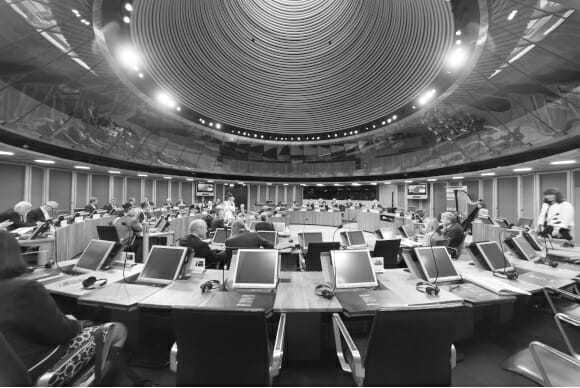As the Senedd pauses for summer recess, Newsdirect Wales’ Seb Bench reflects on the Sixth Senedd’s legislative achievements so far.
After a busy session, Senedd members would be forgiven for having headed to their nearest beach since the start of recess. In fact, anyone working in Welsh policy, communications or public affairs has had just cause to put their feet up after a sometimes hectic and often consequential few months.
As Welsh politics pauses to take a collective breath, it’s worth looking back at the events and achievements of the past few months – namely the four bills progressed through the Senedd.
The Tertiary Education and Research (Wales) Bill
The greatest legislative achievement was the Tertiary Education and Research (Wales) Bill. The bill should shortly become an Act when it receives Royal Assent, but it took some lengthy sessions during the earlier stages of the bill to get to this stage (spare a thought for our education expert Kieran).
The Tertiary Education and Research (Wales) Bill is the most significant reform to post-16 education since the dawn of devolution. A common criticism of Wales’ post-16 sector has been the lack of a cohesive, all-encompassing direction for the sector; with its various branches acting semi-autonomously. The Welsh Government hopes that establishing a new Commission for Tertiary Education and Research (CTER) to manage the sector as a whole will foster a new sense of collaboration and better fluidity through the post-16 sector. The new Commission will replace HEFCW, the body that has looked after higher education in Wales since 1992.
Higher education, further education, research and innovation strategy, adult education, apprenticeships, and sixth forms will all come under the new CTER umbrella. Under the Welsh Government’s plans, we should expect to see the winding-down of HEFCW alongside the new Commission taking its baby steps within the next year.
The bill has not been without its fair share of drama; teaching and students’ unions have not been impressed with their lack of voting rights within CTER, concerns have been raised regarding the focus on research and innovation, and local authorities’ decision-making rights in relation to sixth forms have been raised. The Tories had concerns around academic freedom and the power the Welsh Government reserves under the bill, however ultimately the bill enjoyed unanimous support at the final vote.
The Welsh Tax Acts etc. (Power to Modify) Bill
The Welsh Tax Acts etc. (Power to Modify) Bill also completed its passage through the Senedd at the end of the session, although it had a very different journey. As a technical and limited piece of legislation, the different stages of the bill were much shorter. Disagreements focused on a few specific points and the bill smoothly passed its first three stages.
Approaching the fourth stage however, rumours swirled of a united opposition to the bill leading to a tied vote, which would have caused the legislation to fall. Ultimately, lone Welsh Lib Dem Jane Dodds abstained on the bill, allowing it to pass and drawing the ire of Plaid Cymru. Plaid Cymru had tried to use the vote to force concessions on unrelated rules on Nitrate Vulnerable Zones (NVZs) – areas designated as being at risk from agricultural pollution. There were contrasting accounts on how close opposition parties were to forcing concessions from the Welsh Government.
The saga reminds us that whilst Welsh Labour had a stronger than expected performance at last year’s Senedd elections, they do only hold half of the seats in the Siambr. If the Tax Act shenanigans haven’t damaged trust between Plaid Cymru and the Liberal Democrats, they could show opposition parties what could be achieved with a more strategic approach.
There may also be implications for the Co-operation Agreement between Labour and Plaid Cymru. The agreement does include the deployment of NVZ regulations, but Plaid Cymru claimed it doesn’t cover the changes to regulations recommended by a Senedd committee, recommendations Plaid Cymru wanted implemented.
Future attempts by Plaid Cymru to unite opposition parties to potentially derail Welsh Government legislation could strain relations between Labour and Plaid Cymru, especially if it affects policy areas that are covered by the Co-operation Agreement. Labour also might not generally be pleased that having negotiated the Co-operation Agreement, Plaid Cymru are attempting to secure additional concessions through other means.
With plenty of Welsh Government legislation in the pipeline when the Senedd returns, we’ll have plenty of opportunities to see how effectively Labour and Plaid Cymru can work together to pass legislation.
Social Partnership and Public Procurement Bill
One piece of legislation that will continue its journey through the Senedd in the autumn is the Social Partnership and Public Procurement Bill. The bill comes at a time of noticeable worker unrest across the country due to enormous inflationary pressures. With several different professions planning to strike later this year or holding ballots on strike action, industrial relations are likely to become increasingly important and contentious. Adding fuel to the fire, the UK Government has also threatened to scrap the Trade Union (Wales) Act 2017 – a threat that was, suffice to say, not received well in Cathays Park and wider political circles.
Support for or opposition to the Social Partnership Bill is likely to reflect each party’s longstanding views on trade unions. That being said, Senedd Committee evidence sessions on the bill have so far focused on the extent to which the bill would make a difference and achieve its objectives. Though there is optimism from both the public and private sector, there is a broad consensus that social partnership – i.e., seats for workers at the policy-making table – has been the norm in Wales. There is therefore scepticism in some quarters as to whether the legislation is wholly necessary.
Historic Environment (Wales) Bill
With smaller fanfare, Counsel General Mick Antoniw brought forward the Historic Environment (Wales) Bill – a consolidation bill that streamlines existing legislation on the historic environment, such as listed buildings and conservation areas. This is deemed necessary due to the outmoded nature of legislation, with terminology and detail that predates devolution.
Alongside the Social Partnership Bill and Historic Environment Bill, there will be other legislation that will be considered by the Senedd when it returns in the autumn. The First Minster’s legislative statement in July demonstrates a commitment to the green agenda, and there is plenty to discuss in this area.



